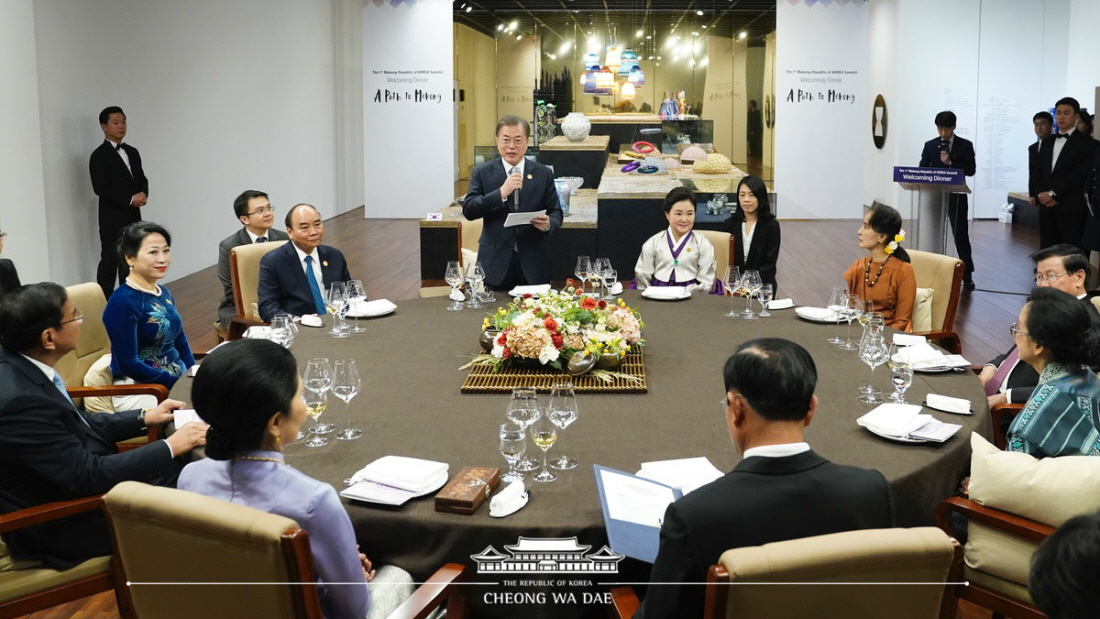이 웹사이트는 제19대 대통령 임기 종료에 따라 대통령기록관이 「대통령기록물 관리에 관한 법률」에 의해 이관받아 서비스하는 대통령기록물입니다. 자료의 열람만 가능하며 수정 · 추가 · 삭제는 불가능합니다.
다만, 「개인정보보호법」에 의하여 개인의 정보를 보호받기 원하시는 분은 관련 내용(요청자, 요청내용, 연락처, 글위치)을 대통령 웹기록물 담당자(044-211-2253)에게 요청해 주시면 신속히 검토하여 조치해 드리겠습니다. 감사합니다.
SPEECHES & REMARKS
BRIEFINGS
Remarks by President Moon Jae-in at Welcoming Dinner for Mekong-Republic of Korea Summit

It is my great honor to have gathered here the leaders spearheading the efforts for the Mekong’s vigorous takeoff as well as their spouses.
Prime Minister Prayut and Mrs. Naraporn of Thailand, Prime Minister Phuc and Mrs. Thu of Viet Nam, Prime Minister Thongloun and Mrs. Naly of Laos, State Counsellor Daw Aung San Suu Kyi of Myanmar and Deputy Prime Minister Prak Sokhonn of Cambodia, I extend my special welcome once again.
I am all the more pleased to have an opportunity in my hometown of Busan to reciprocate the Mekong leaders’ warm hospitality extended to me and my wife.
Busan is a city that has longstanding affinities with the Mekong nations. Approximately 1,500 years ago, the Buddhism worshipped in the Mekong Basin came to Busan and its environs, spreading throughout the Korean Peninsula. Such relations are maintained at Busan’s Taejongsa Temple, Korea’s first Theravada Buddhist monastery.
That spirit of sharing and mutual benefit, which cherishes life and pursues harmonious coexistence with nature, has been a part of the people of the Mekong region for much longer, and in the same way, it has remained deep in the hearts of the Korean people.
The numerous similarities between us make Koreans feel very comfortable with and close to the Mekong countries. Last year, a record 5.8 million Koreans visited the Mekong region and were met with warm smiles there. Here in Korea, it has become very common to see people lining up to enjoy rice noodles and other traditional foods of the Mekong countries.
People from Mekong countries and Korea are becoming friends who share a deep and heart-to-heart understanding. I am all the more delighted that young people, just like the students who introduced their countries’ cultures and arts a while ago, are acting as bridges between the two sides.
Korea and Mekong countries have taken similar paths as well. We prevailed over hardships during the imperialist era and achieved growth, preserving our survival and dignity while stuck between major powers during the Cold War.
Korea achieved the Miracle on the Hangang River, and countries in the Mekong region are writing a new chapter of history – the Miracle on the Mekong River. I am confident that the dynamism of the Mekong and Korea’s experience will combine to bring us all a miracle.
The nations along the Mekong River that grow by embracing and relying on each other – as taught by the Mekong, “the Mother of Rivers” – are also partners for peace on the Korean Peninsula. The Mekong countries have played a significant role in maintaining regional peace and stability and easing tension on the Peninsula by encouraging North Korea to become a member of the international community.
When North Korea joins the international community following denuclearization, Mekong countries are the ones that can share their experiences and offer the best possible assistance. I hope that with your support and encouragement, the leaders of the two Koreas will someday be able to dine with the Mekong leaders.
In September, I unveiled the Republic of Korea-Mekong Vision in Laos. I hope that the Mekong-Republic of Korea Summit tomorrow will be the first step toward realizing prosperity with shared experiences, sustainable prosperity, and peace and mutual prosperity in East Asia.
I wish the ASEAN leaders and their spouses good health and happiness. I would like to propose a toast to Korea and the Mekong nations’ eternal friendship and mutually prosperous future.
Geonbae!



